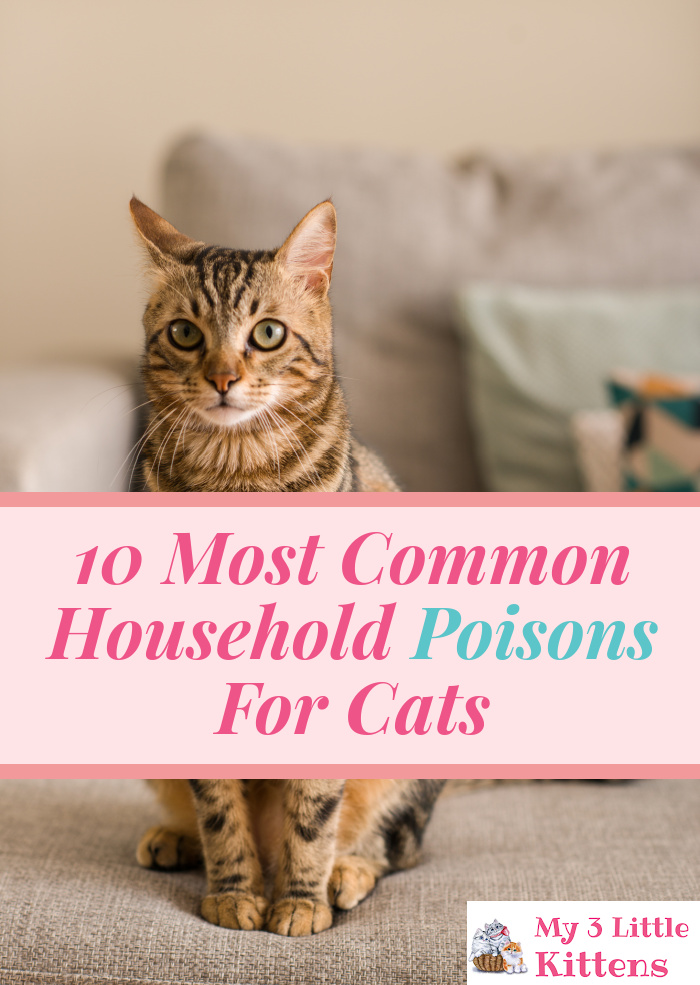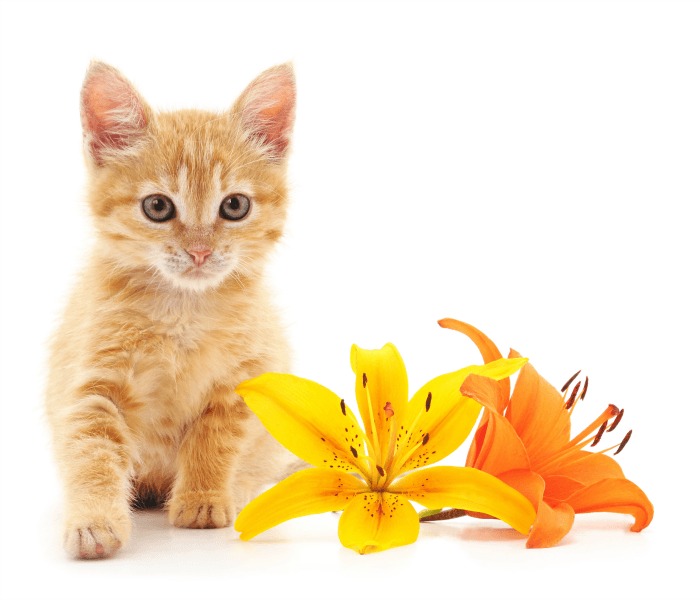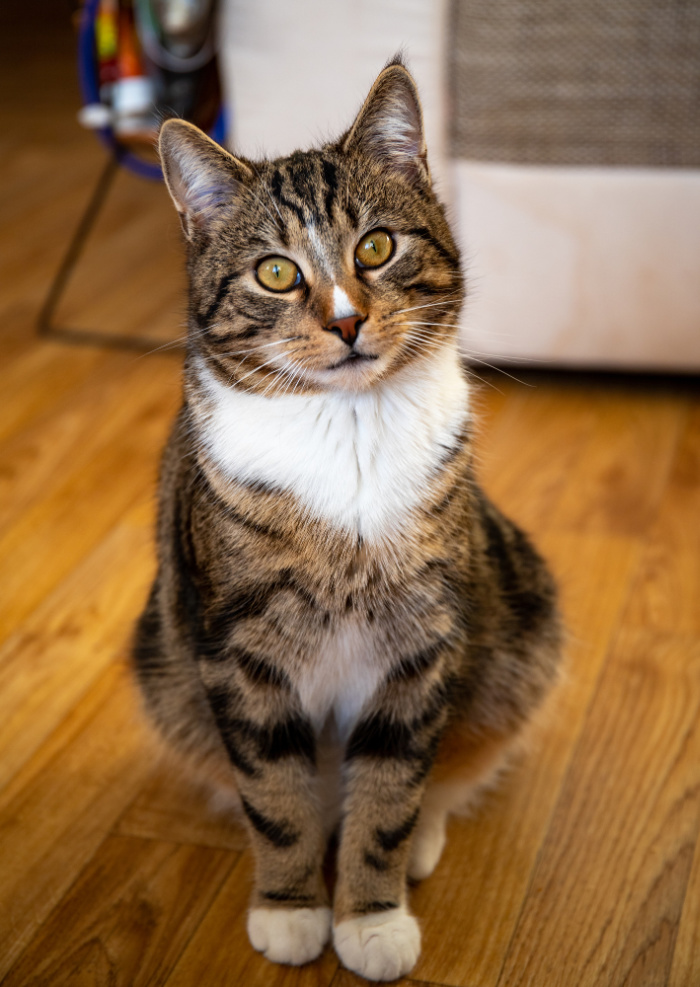Cats are beloved members of countless households, bringing joy and companionship to their owners.
As responsible pet parents, it’s crucial to create a safe environment for our feline friends.
Unfortunately, many everyday items found in our homes can pose serious threats to their health. Let’s explore the 10 most common household poisons for cats and tips on how to keep your curious companions out of harm’s way!

Top 10 Most Common Household Poisons for Cats
Household Cleaners – This is usually the most obvious poison. From childhood, most are taught that household cleaners are a poison zone. We need to remember this also applies to our pets. Keep in mind that your cat walks around the house and lick their paws.
Many household cleaners contain chemicals that are harmful to cats. Bleach, toilet bowl cleaners, and window cleaners can cause respiratory distress and digestive issues if ingested. When using these products, ensure proper ventilation and keep your cat away until surfaces are dry.

Household Plants – Most of us enjoy the relaxing space an indoor plant can create. However, the list of poisons plants for cats is long. The Lily, Peace Lily, Tulip, Oleander, English Ivy, Castor Bean, Yew, Sago Palm, Azalea, Chrysanthemum are just to name a few.
When considering getting a household plant, do your cat a favour and find out if the plant is safe. It takes 5 seconds to Google the plant name and save the life of your cat.

Protect Your Feline Friend from Household Poisons
Essential Oils – As cautious as I usual am, I have to say that even I had no idea essential oils were poisonous to cats. I would use them in my diffuser daily without even knowing that I could be poisoning my beloved cats. The moment I found out the truth, I stopped.
Some of the most poisons essential oils for your cat are lemon, lime, clementine, clove, eucalyptus, grapefruit, orange, peppermint, tea tree, thyme, spearmint, rosemary, tangerine, sage, pine, mandarin, oregano, lavender, frankincense, camphor and bergamot. Again, Google your essential oil before you use it around your cat.

Human Medications – We know the importance of keeping our medications safe from children. However, it is often forgotten that medications are a danger to our pets. Whether it be in a pill, liquid, or given by needle, human medication is a poison to your cat.
The best choice is to keep your medications in a cabinet that your cat cannot get to or open. Keeping a pill count can also make sure that no medication is accidentally lost as well. To your cat, they can look like a treat or a toy, which you don’t want.

More Common Household Poisons for Cats
Pesticides – Common household pesticides, including insecticides and rodenticides, can be toxic to cats. Always follow the instructions carefully, and consider using pet-friendly alternatives.
If you suspect your cat has come into contact with these substances, seek veterinary attention immediately.

Flea/Tick Medications – Ingredients found within flea/tick medications are extremely harmful to cats, who are more sensitive to these than even dogs. Even a simple application can go horribly wrong.
Keep in mind that even if it is another pet that is being treated, your cat may still come in contact and a sensitivity to the medication can be fatal.

Foods Toxic to Cats – Certain foods that are safe for humans can be poisonous to cats. Onions, garlic, chocolate, caffeine, alcohol, and certain artificial sweeteners (like xylitol) can lead to serious health issues.
Be cautious about sharing your meals with your feline friend and keep harmful foods out of reach.

Make Sure to Check Your Home For These Poisons
String and Small Objects – Cats are notorious for playing with string, yarn, and small objects. However, ingesting these items can lead to intestinal blockages or other digestive issues.
Keep an eye on your cat’s playthings and ensure they are safe and appropriate.

Lead – Lead poisoning can occur if a cat chews on items containing lead, such as old painted surfaces, curtain weights, or certain toys. Regularly inspect your home for potential sources of lead and remove them promptly.
Cigarette Smoke – Secondhand smoke poses a significant health risk to cats, causing respiratory issues, allergies, and even cancer. If you’re a smoker, consider smoking outside to minimize your cat’s exposure to harmful chemicals.

Creating a safe and toxin-free environment for your cat is essential for their well-being. By being aware of common household poisons and taking preventive measures, you can ensure a happy and healthy life for your feline friend.
Regular veterinary check-ups, a cat-proofed home, and a watchful eye will go a long way in safeguarding your beloved pet from potential dangers.
LisaM says
So many things I just never think about! Thanks so much.
kristen visser says
I knew about most of these….i neveer take the chance with plants and flowers as my cat loves to chew and eat them. I have no idea about onion and garlic. thankfully he has never wanted to eat that but definitely good to know
kathy downey says
Thanks so much for sharing these even though I know most of these a reminder now and then is good
Elizabeth Matthiesen says
A great list for those with cats as pets, it’s important to know what’s poisonous to them.
carole harris says
great tips. thank you.
Monika says
Lately, I’ve seen so many posts on social media about flea medications killing cats or making them sick, it is terrible. Everyone should avoid Hertz products, that’s for sure! Thank you for this reminder. It is never enough of safety talk when it comes to our loved ones.
Amy D says
Wow! I didn’t know about the garlic and onions. I’ll make sure my kitties stay away.
kathy downey says
I had a Cat years ago and you couldn’t keep a grape on the counter because he would eat them. We has to put them in the fridge as soon as we unpacked them.
Calvin says
Will be sure to avoid these, I didn’t know about the onions..